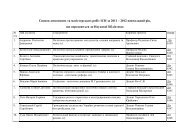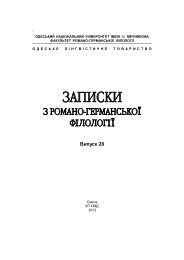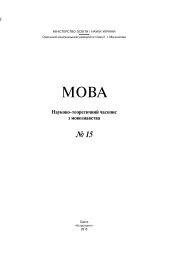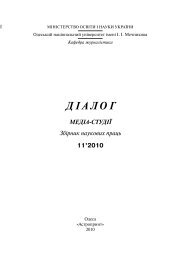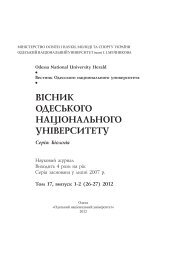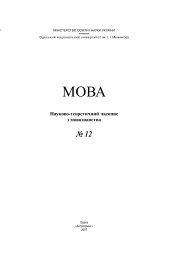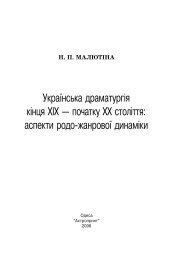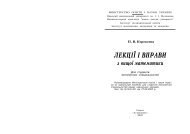Ðип. 26 (2011)
Ðип. 26 (2011)
Ðип. 26 (2011)
You also want an ePaper? Increase the reach of your titles
YUMPU automatically turns print PDFs into web optimized ePapers that Google loves.
Pasternak T. A.COMMUNICATIVE STRATEGIES OF ENGLISH «JOB INTERVIEW» ...<br />
describes how effective communication in conversation is achieved in common<br />
social situations and is further broken down into the four Maxims of Quality,<br />
Quantity, Relevance and Manner. According to P. Grice, if a speaker observes this<br />
principle and is aware of mentioned maxims, it enables him to conclude about the<br />
strategies and hidden intentions of the interlocutor, generated as implicatures. The<br />
implicatures are understood as communicatively significant deviations of conserving<br />
predictable and generally-accepted conversational maxims. For example, the<br />
phrase following at the end of the job interview “Do you work with an agent?”<br />
is perceived by both interactants as mutually shared sign of successful outcome<br />
of the job interview – the candidate is hired. Flouting the Maxims of Relevance<br />
and Quantity in this case (previous discussion of the candidate’s working experience<br />
„ ... we’ll walk over to Projection and look at your film and videos” is not<br />
connected with the interviewer’s question about the agent „Do you work with an<br />
agent?”) leads to the deduction of the conversational implicature: “If you have<br />
an agent we’d like to negotiate terms of your work contract with him”.<br />
We are going to analyze the conversational maxims and their flouting or<br />
violating by the participants in the communicative strategies of English “job<br />
interview”.<br />
The Maxim of Quantity is connected with the quantity of information, which is<br />
necessary to deliver. It states: “Make your contribution as informative as is required<br />
and do not make your contribution more informative than is required by the local<br />
aim”. There are some doubts concerning the excessive information: whether it’s a<br />
violation of cooperative principle or individual peculiarity of a speaker. Sometimes<br />
excessive information can delude a speaker, causing additional questions and<br />
reasoning. Besides there can appear a side effect when a deluded speaker might<br />
look for hidden aims or significance of delivering such information.<br />
Let’s consider the example:<br />
Michael: Okay. I just saw a little gap here in your resume … eighteen months<br />
… what were you doing?<br />
Alexander: I was finishing my Master’s thesis on Ladislav Klima, the Czech<br />
novelist and philosopher. It was the most important thing in the world for me,<br />
so I had to take some time out.<br />
Michael: That’s interesting.<br />
Alexander: Yes. You know, and Ladislav Klima is my hero. He only ever took<br />
on short-time work, so I wanted to see the world through his eyes.<br />
Michael: Right. Got that. So, what do you consider to be your greatest<br />
accomplishment?<br />
In the job interview for a position of a supervisor in an electronics retail store<br />
the interviewer finds a hidden significance of delivered detailed information about<br />
18-months gap in the candidate’s resume:<br />
301




